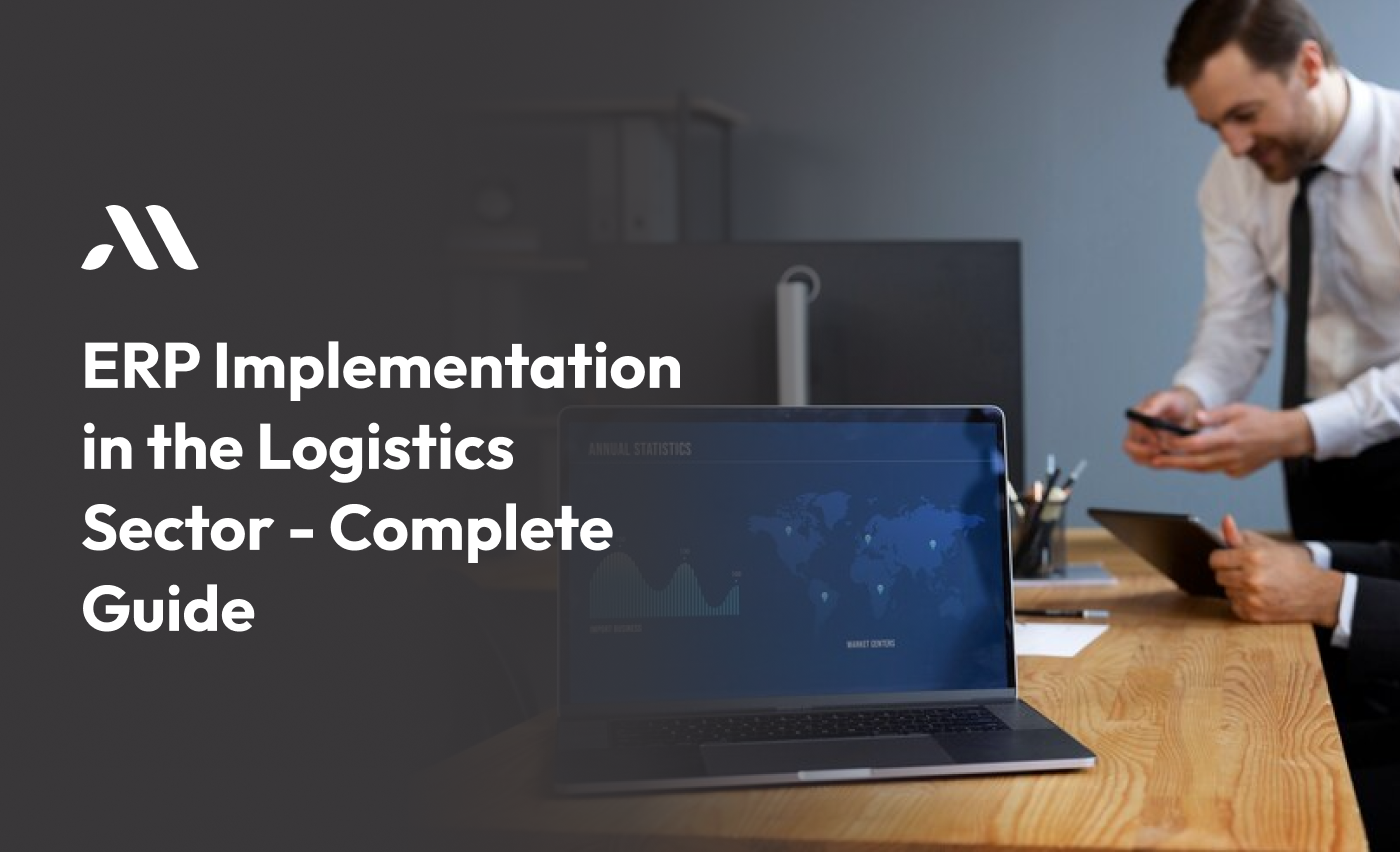In today's fast-moving world, logistics businesses face many challenges. From managing large fleets of trucks to tracking shipments and maintaining accurate inventory records, logistics companies need tools that help them work efficiently. This is where ERP implementation in the logistics sector comes in. An ERP (Enterprise Resource Planning) system can make logistics operations smoother and more effective. In this guide, we will walk you through what ERP implementation is, how it helps the logistics sector, and why working with a custom ERP development company is beneficial.
What is ERP?
ERP stands for Enterprise Resource Planning. It is software that helps businesses manage all their activities in one place. Whether it's tracking shipments, managing warehouses, or handling customer orders, an ERP system can help. In the logistics sector, ERP implementation is especially important because logistics companies often have a lot of moving parts to manage.
“By 2025, the global ERP software market is expected to reach $78.4 billion, proving its growing importance in industries like logistics.” – Statista
- According to a report, 95% of businesses say their ERP system has improved their operations.
- Businesses using ERP systems see an average 15% improvement in operational efficiency.
- 81% of companies believe ERP systems play a crucial role in their business success.
Why ERP Implementation is Important for the Logistics Sector
ERP implementation in the logistics sector is crucial for several reasons. Let’s break them down:
Improves Efficiency
One of the biggest advantages of ERP implementation in the logistics sector is the boost in efficiency. With all the processes linked together in one system, companies can reduce manual work and errors. According to a 2023 study, businesses that implemented ERP saw a 20% improvement in operational efficiency.
Better Tracking and Monitoring
Logistics businesses need to track vehicles, shipments, and inventory all the time. An ERP system allows companies to monitor everything in real-time, reducing delays and ensuring that customers receive their orders on time.
Cost Reduction
Implementing an ERP system can help logistics companies save money by automating tasks. A report found that companies save up to 15% on operational costs after ERP implementation. The system reduces paperwork, labour hours, and mistakes, which ultimately cuts costs.
Enhanced Customer Service
A logistics company relies on happy customers. ERP systems help improve communication with clients by providing real-time updates on their shipments. When customers know where their orders are and when they will arrive, they are more satisfied with the service.
Data Management
Data is at the heart of any logistics business. Keeping track of deliveries, orders, and fleet maintenance can be overwhelming without the right tools. With ERP implementation, companies can store and manage data efficiently. This helps logistics businesses to make informed decisions and grow strategically.
Key Features of ERP for the Logistics Sector
Now that we understand the importance of ERP implementation in the logistics sector, let’s look at some key features that make it so valuable:
Inventory Management
Knowing what’s in stock and where it’s located is critical for logistics companies. ERP systems can track inventory levels and predict when to order more, ensuring that operations don’t slow down due to shortages.
Fleet Management
An ERP system can keep track of every vehicle in a logistics company’s fleet. From scheduling maintenance to monitoring fuel usage, the system provides all the information needed to run a smooth operation.
Shipment Tracking
With ERP implementation, logistics companies can give their clients real-time updates on shipments. This feature allows for better planning and avoids surprises that can lead to customer complaints.
Warehouse Management
ERP systems help organize warehouses, ensuring that products are stored efficiently and are easy to find. This cuts down on the time it takes to pick, pack, and ship orders, leading to faster delivery times.
Financial Management
Managing the finances of a logistics company is complex. ERP systems simplify this by tracking costs, invoicing, and payroll in one place. This provides better visibility into a company’s financial health.
Steps to ERP Implementation in the Logistics Sector
Implementing an ERP system in the logistics sector may seem overwhelming, but with the right approach, it can be smooth and successful. Here’s a step-by-step guide to help logistics business owners:
Define Business Needs
Before you start with ERP implementation, it’s important to identify what your business needs. Are you looking to improve inventory management or reduce costs? Having clear goals helps guide the implementation process.
Choose the Right ERP System
Not all ERP systems are the same. It’s essential to choose an ERP solution that fits your business’s unique needs. Some logistics companies work with a custom ERP development company to get software tailored to their operations.
Plan the Implementation Process
Create a timeline and allocate resources for the ERP implementation process. It's important to involve key team members, as they will be the ones using the system daily.
Train Your Team
One of the most critical steps in ERP implementation is training. Your team needs to understand how to use the new system. This training should be simple and clear, so everyone knows how to make the most of the ERP system.
Also Read - ERP vs CRM: What Does Your Startup Need?
Challenges in ERP Implementation in the Logistics Sector
While ERP implementation in the logistics sector has many benefits, it’s not without challenges. Being prepared can help you overcome these obstacles.
Data Migration
Moving all your existing data into a new ERP system can be tricky. Make sure to back up your data and work closely with your custom ERP development company to ensure a smooth migration.
Resistance to Change
Employees may resist using a new system, especially if they’re used to doing things a certain way. To overcome this, involve your team in the ERP implementation in the logistics sector from the start and provide ample training.
Customization
Every logistics business is unique, and a one-size-fits-all ERP system may not work for you. This is where working with a custom ERP development company comes in handy. They can tailor the system to fit your specific needs.
Choosing a Custom ERP Development Company
When it comes to ERP implementation in the logistics sector, working with a Custom ERP Development Company is usually the best choice. These companies specialize in creating ERP systems tailored to your business needs. They understand the logistics industry and can help you build a system that works for you.
“Custom ERP systems offer businesses the flexibility and efficiency they need to stay ahead in the logistics sector.” – Industry Expert
Conclusion
ERP implementation in the logistics sector is a game-changer for logistics businesses. From improving inventory management to simplify communication, ERP systems can help you operate more efficiently and save costs. While there may be challenges, choosing the right system and working with a custom ERP development company can ensure success. Remember to assess your needs, plan your budget, and provide proper training to your team. With the right approach, your logistics business will thrive with ERP.
Looking for a smooth ERP solution for your logistics business? MicraSol can help! Our custom ERP systems are designed to boost efficiency, reduce costs, and simplify your operations. Let us take your logistics to the next level. Contact MicraSol today and get started on your ERP journey!
FAQS
What is ERP, and why is it important for the logistics sector?
ERP (Enterprise Resource Planning) is a system that helps businesses manage their operations like tracking inventory, managing orders, and finances, all in one place. For logistics companies, ERP implementation helps make everything run smoothly, reducing errors, saving time, and improving customer service.
How can ERP help my logistics business?
ERP systems help in many ways! They can improve inventory management, making it easier to know what’s in stock. They also help with tracking shipments, so you always know where your deliveries are. ERP systems even help different teams in your company work together better by improving communication.
Is ERP implementation expensive for logistics companies?
Yes, ERP implementation in the logistics sector can be costly at first. But over time, it saves you money by reducing mistakes, improving efficiency, and helping you make better business decisions. It’s a smart investment that pays off in the long run.
What should I do before choosing an ERP system for my logistics business?
Before choosing an ERP system, assess your company’s needs. Do you need better shipment tracking? Do you want to improve inventory management? Make a list of your goals so that you can choose an ERP system that’s right for your business.
How long does it take to implement an ERP system in the logistics sector?
The time it takes for ERP implementation depends on the size of your business and the complexity of the system. On average, it can take several months to a year to fully implement and get your team trained. Working with a custom ERP development company can help speed up the process.








